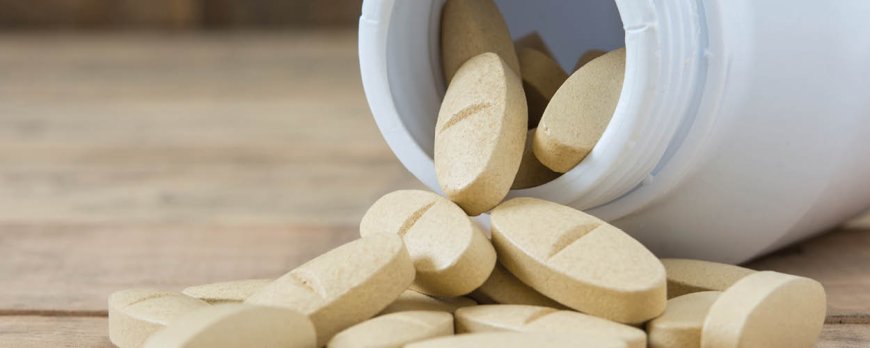How Long Does It Take for Probiotics to Reduce Bloating?
Discover 'How long does it take for probiotics to reduce bloating?' Learn the timeline, causes of bloating & the potential benefits of probiotics.

How Long Does It Take for Probiotics to Reduce Bloating?
Probiotics are known for their potential to reduce bloating, but the time it takes for them to take effect can vary. The individual response to probiotics and the specific strains used play a significant role in determining how quickly bloating symptoms may be alleviated. It is essential to choose a high-quality probiotic supplement and follow the recommended dosage instructions to optimize their effectiveness in improving gut health.
Key Takeaways:
- The timeframe for probiotics to reduce bloating varies from person to person.
- Short-term relief of symptoms like diarrhea may occur within a few days of using certain probiotics.
- For chronic conditions or overall gut health, continuous use of probiotics for several weeks or months may be necessary to see significant improvements.
- Selecting a high-quality probiotic supplement is crucial for achieving desired results.
- Follow the recommended dosage instructions to maximize the benefits of probiotics in reducing bloating and promoting digestive health.
While probiotics can play a beneficial role in supporting gut health and reducing bloating, it is important to understand that individual responses may vary. Patience and persistence are key when incorporating probiotics into your wellness routine, and consulting with a healthcare professional can provide personalized guidance for optimal results.
Understanding Bloating and Its Causes
Before exploring how probiotics can help reduce bloating, it's important to understand the causes behind this uncomfortable symptom. Bloating is characterized by a feeling of fullness or tightness in the abdomen, often accompanied by excessive gas and discomfort. It can be caused by a variety of factors, including poor digestion, excessive gas production, and imbalances in the gut microbiota.
The digestive process is complex, involving the breakdown of food, absorption of nutrients, and the production of gas as a byproduct. When digestion is compromised or imbalances occur in the gut microbiota, the result can be bloating. Certain foods, such as those high in fiber or carbohydrates, can also contribute to bloating by increasing gas production. Stress and certain medical conditions, like irritable bowel syndrome (IBS), can further exacerbate bloating.
To address bloating, probiotics can be a natural and effective solution. Probiotics are beneficial bacteria that help restore the balance of the gut microbiota, supporting overall digestive health. By promoting the growth of beneficial bacteria and inhibiting the overgrowth of harmful bacteria, probiotics can improve digestion, reduce gas production, and alleviate bloating.
How Probiotics Aid in Digestive Health
Probiotics offer numerous benefits for digestive health, which can translate into relief from bloating and other gastrointestinal troubles. These beneficial bacteria help restore the balance of the gut microbiota, improving digestion and reducing excessive gas production. By colonizing the intestines, probiotics can enhance the absorption of nutrients and promote the breakdown of food, leading to more efficient digestion.
Furthermore, probiotics can strengthen the gut barrier function, preventing harmful substances and pathogens from entering the bloodstream. This can be especially beneficial for those suffering from conditions like leaky gut syndrome, where a compromised intestinal barrier can contribute to bloating and other digestive symptoms.
In addition to their direct effects on digestion, certain strains of probiotics have been shown to have anti-inflammatory properties. By reducing inflammation in the gut, probiotics can alleviate symptoms of bloating and other gastrointestinal conditions. They can also support immune function and overall gut health, providing a comprehensive approach to addressing the underlying causes of bloating.

Short-Term Relief: Probiotics for Acute Bloating
When it comes to short-term relief from bloating, certain probiotics have shown promise in providing rapid symptom improvement. These probiotics work by restoring the balance of beneficial bacteria in the gut, reducing inflammation, and improving digestion.
One study found that a specific strain of probiotic, Lactobacillus acidophilus, was effective in relieving bloating and gas within just a few days. Another study showed that a combination of probiotic strains, including Bifidobacterium lactis and Lactobacillus plantarum, helped alleviate symptoms like diarrhea and abdominal discomfort.
It is worth noting that the effectiveness of probiotics for acute bloating can vary depending on factors such as the individual's gut microbiota composition and the specific probiotic strains used. Therefore, it is important to choose a high-quality probiotic supplement that contains clinically tested strains and follow the recommended dosage instructions.
The potential short-term benefits of probiotics for acute bloating:
- Restoring the balance of beneficial bacteria in the gut
- Reducing inflammation and improving digestion
- Alleviating symptoms like bloating, gas, and diarrhea
- Providing rapid relief within a few days
While probiotics can offer short-term relief for acute bloating, it is important to remember that individual results may vary. For chronic bloating conditions such as IBS or IBD, consistent, long-term use of probiotics may be necessary to achieve sustained improvements in symptoms and overall gut health.
It is always recommended to consult with a healthcare professional before starting any new supplement regimen, especially if you have specific health concerns or are taking other medications. Patience and persistence are key when using probiotics for bloating relief, as it may take time to see the full potential of these beneficial bacteria in supporting your digestive health.
Chronic Conditions: Long-Term Use of Probiotics
For individuals dealing with chronic bloating, incorporating probiotics into their daily routine may be an effective long-term strategy. Probiotics, which are beneficial bacteria, can help restore the balance of microbes in the gut and improve overall digestive health. However, it's important to note that the timeframe for seeing significant improvements can vary from person to person.
Some studies have shown that consistent, long-term use of probiotics can lead to sustained improvements in symptoms of bloating. However, it may take several weeks or even months of continuous use to experience the full benefits. This is because probiotics work by gradually colonizing the gut and establishing a more balanced ecosystem, which takes time to achieve.
When choosing a probiotic supplement for chronic bloating, look for one that contains specific strains of bacteria that have been shown to be effective in reducing bloating symptoms. It's also crucial to follow the recommended dosage instructions to ensure optimal results. Consulting with a healthcare professional can provide valuable guidance in selecting the right probiotic and determining the appropriate duration of use.
Key Considerations for Long-Term Probiotic Use:
- Select a high-quality probiotic supplement with strains known to support digestive health.
- Follow the recommended dosage instructions to ensure proper intake.
- Give probiotics enough time to establish a positive impact on gut health, as individual response times may vary.
- Monitor symptoms and consult with a healthcare professional if bloating persists or worsens.
By incorporating probiotics into their daily routine and maintaining a patient and persistent approach, individuals with chronic bloating may be able to find relief and improve their overall gut health over time.

Selecting the Right Probiotic Supplement
Not all probiotic supplements are created equal, so it's essential to select one that best suits your needs for bloating relief. When choosing a probiotic supplement, consider the following factors:
- Strains of bacteria: Look for probiotics that contain strains known to support digestive health, such as Lactobacillus acidophilus or Bifidobacterium lactis.
- Colony-forming units (CFUs): The number of CFUs indicates the amount of live bacteria in each dose. Higher CFU counts may be necessary for more severe bloating symptoms.
- Additional ingredients: Some probiotic supplements may include digestive enzymes or prebiotic fibers, which can further support digestive health and bloating relief.
When researching probiotic supplements, read reviews and check for third-party testing and quality assurance certifications. This ensures that the product is reliable and free from contaminants. It's also a good idea to consult with a healthcare professional to determine the best probiotic supplement for your specific needs.
By selecting a high-quality probiotic supplement that aligns with your requirements, you can maximize the potential benefits and improve bloating symptoms over time.
Dosage and Usage Instructions
To maximize the benefits of probiotics for bloating relief, it's crucial to adhere to the recommended dosage and usage instructions. Here are some key guidelines to ensure you are using probiotic supplements effectively:
- Read the label: Carefully read the instructions and dosage recommendations on the product label. Different probiotic supplements may have different concentrations of bacteria and specific usage instructions.
- Take consistently: Consistency is key when it comes to probiotics. Take the recommended dosage regularly, preferably at the same time each day, to maintain a consistent supply of beneficial bacteria in your gut.
- Follow timing instructions: Some probiotics may need to be taken with meals, while others are best taken on an empty stomach. Pay attention to any specific timing instructions provided and follow them accordingly.
- Consider storage requirements: Some probiotics may require refrigeration to maintain their potency. Make sure to store your probiotic supplement as instructed to ensure optimal effectiveness.
It's important to note that the response time for probiotics to alleviate bloating can vary. While some people may experience relief within a few days, others may require several weeks or even months of continuous use to see significant improvements. Patience and consistency are key when using probiotics for bloating relief.
If you have any concerns or questions about using probiotics for bloating, it's always a good idea to consult with a healthcare professional. They can provide personalized advice and guidance based on your specific needs and health conditions.

Individual Variations and Timeframe
It's important to remember that the timeframe for experiencing relief from bloating with probiotics can be different for each individual. The effectiveness of probiotics in reducing bloating is influenced by various factors, such as the underlying cause of bloating, the composition of an individual's gut microbiota, and the specific strains of probiotics used. While some individuals may notice improvements within a few days, others may require several weeks or even months of consistent probiotic usage to achieve the desired results.
To determine the most effective probiotic strain and dosage for reducing bloating, it's advisable to consult with a healthcare professional familiar with probiotics and digestive health. They can help assess your specific needs and recommend a suitable probiotic supplement. It's also important to choose a high-quality product, as the potency and viability of probiotics can vary among different brands.
Factors to Consider:
- Underlying Cause: Bloating can be caused by various factors, including poor digestion, excessive gas production, and imbalances in the gut microbiota. Different probiotic strains may target specific causes more effectively.
- Gut Microbiota Composition: The unique combination of bacteria in an individual's gut can influence how they respond to probiotics. Some individuals may naturally have a more balanced microbiota, making them more receptive to probiotic supplementation.
- Probiotic Strains: Not all probiotic strains are created equal. Some strains have been studied extensively for their ability to alleviate bloating, while others may have limited evidence supporting their efficacy.
- Consistency and Patience: Probiotics work by gradually restoring the balance of beneficial bacteria in the gut. Therefore, it's important to take probiotics consistently and give them enough time to establish an impact. Results may vary, and it's essential to be patient throughout the process.
In conclusion, probiotics have the potential to reduce bloating and promote overall gut health. However, the timeframe for experiencing relief can vary from person to person. Finding the most suitable probiotic strain and carefully following dosage instructions are crucial steps in maximizing the benefits of probiotics. Remember to consult with a healthcare professional and exercise patience when incorporating probiotics into your wellness routine.
Realizing the Full Potential: Patience and Persistence
While some individuals may experience rapid relief from bloating with probiotics, others may need to be patient and persistent to realize the full potential benefits. The time it takes for probiotics to reduce bloating can vary depending on various factors, including the underlying cause of bloating, the individual's gut microbiota composition, and the specific probiotic strains being used.
For short-term relief of symptoms like diarrhea or temporary bloating caused by dietary changes or antibiotics, some probiotics have shown to work within a few days. However, for chronic conditions or overall gut health, it may take several weeks or even months of continuous use to see significant improvements. It is important to note that consistency is key when it comes to probiotic supplementation.
Factors Affecting Individual Results
- The Underlying Cause: Bloating can have various causes, such as poor digestion, excessive gas production, or imbalances in the gut microbiota. The time it takes for probiotics to alleviate bloating may depend on addressing the specific underlying cause.
- Gut Microbiota Composition: Each individual has a unique gut microbiota composition. The response to probiotics may differ based on the current balance of beneficial and harmful bacteria in the gut.
- Probiotic Strains Used: Different strains of probiotics may have varying effects on bloating. It is important to choose a probiotic supplement that contains strains known to be beneficial for digestive health.
To optimize the effectiveness of probiotics in reducing bloating, it is crucial to select a high-quality probiotic supplement and follow the recommended dosage instructions. Consulting with a healthcare professional can provide personalized guidance and recommendations based on individual needs.
Overall, probiotics can play a beneficial role in supporting gut health and reducing symptoms of bloating. However, it is important to understand that individual results may vary, and patience and persistence are key to realizing the full potential benefits of probiotics.

Conclusion
Probiotics can play a valuable role in reducing bloating and improving digestive health, but it's important to remember that the response time may vary for each individual.
When it comes to short-term relief of symptoms like diarrhea and gas, some probiotics have been shown to work within a few days. However, for chronic conditions or overall gut health, it may take several weeks or even months of continuous use to see the full effects of probiotics.
To maximize the benefits of probiotics, it is crucial to select a high-quality probiotic supplement that contains the specific strains of bacteria known to support digestive health. Follow the recommended dosage instructions to ensure you are taking the right amount of probiotics consistently.
While probiotics can be a natural and effective solution for reducing bloating, it is important to understand that individual results may vary. Be patient and persistent, giving probiotics enough time to establish a positive impact on your gut health. If symptoms persist, consider consulting with a healthcare professional for further guidance.
FAQ
How long does it take for probiotics to reduce bloating?
The time it takes for probiotics to reduce bloating can vary depending on the individual and the specific probiotic strain being used. For short-term relief of symptoms like diarrhea, some probiotics may work within a few days. However, for chronic conditions or overall gut health, it may take several weeks or even months of continuous use to see the full effects of probiotics. It is important to select a high-quality probiotic supplement and follow the recommended dosage instructions. Overall, probiotics can play a beneficial role in supporting gut health and reducing symptoms of bloating, but individual results may vary.
What is bloating and what causes it?
Bloating is a sensation of fullness or tightness in the abdomen caused by excess gas or fluid in the digestive system. Common causes of bloating include poor digestion, excessive gas production, and imbalances in the gut microbiota.
How do probiotics aid in digestive health?
Probiotics help support digestive health by restoring the balance of beneficial bacteria in the gut, improving digestion, and reducing excessive gas production. They can help alleviate symptoms of bloating by promoting a healthy gut microbiota.
Can probiotics provide short-term relief for bloating?
Yes, some probiotics have been shown to provide short-term relief for acute bloating episodes. They can work within a few days to alleviate symptoms like diarrhea and gas. However, individual responses may vary.
Are probiotics effective for chronic bloating conditions?
Probiotics may be helpful for chronic bloating conditions, such as irritable bowel syndrome (IBS) or inflammatory bowel disease (IBD). However, consistent, long-term use of probiotics may be necessary to see sustained improvements in symptoms and overall gut health.
How do I choose the right probiotic supplement?
When selecting a probiotic supplement, consider factors such as the specific strains of bacteria, the number of colony-forming units (CFUs), and the presence of additional digestive enzymes or prebiotic fibers. It is important to choose a high-quality supplement that suits your specific needs.
What is the recommended dosage for probiotics?
It is important to follow the recommended dosage instructions provided with your probiotic supplement. Taking the right amount of probiotics consistently can optimize their effectiveness in reducing bloating and improving gut health.
How long does it take for probiotics to work for bloating?
The timeframe for probiotics to reduce bloating can vary from person to person. Factors such as the underlying cause of bloating, the individual's gut microbiota composition, and the specific probiotic strains used can influence the response time. It may take several weeks or even months of continuous use to see the full effects of probiotics.
Do probiotics always work for bloating?
While probiotics can play a beneficial role in reducing bloating and supporting gut health, individual results may vary. It is important to remember that probiotics are not a one-size-fits-all solution, and consulting with a healthcare professional can help determine the best approach for your specific needs.
Should I be patient when taking probiotics for bloating?
Yes, patience and persistence are key when using probiotics for bloating. It takes time for probiotics to establish a positive impact on gut health. If symptoms persist or worsen, it is recommended to consult with a healthcare professional.































































































































